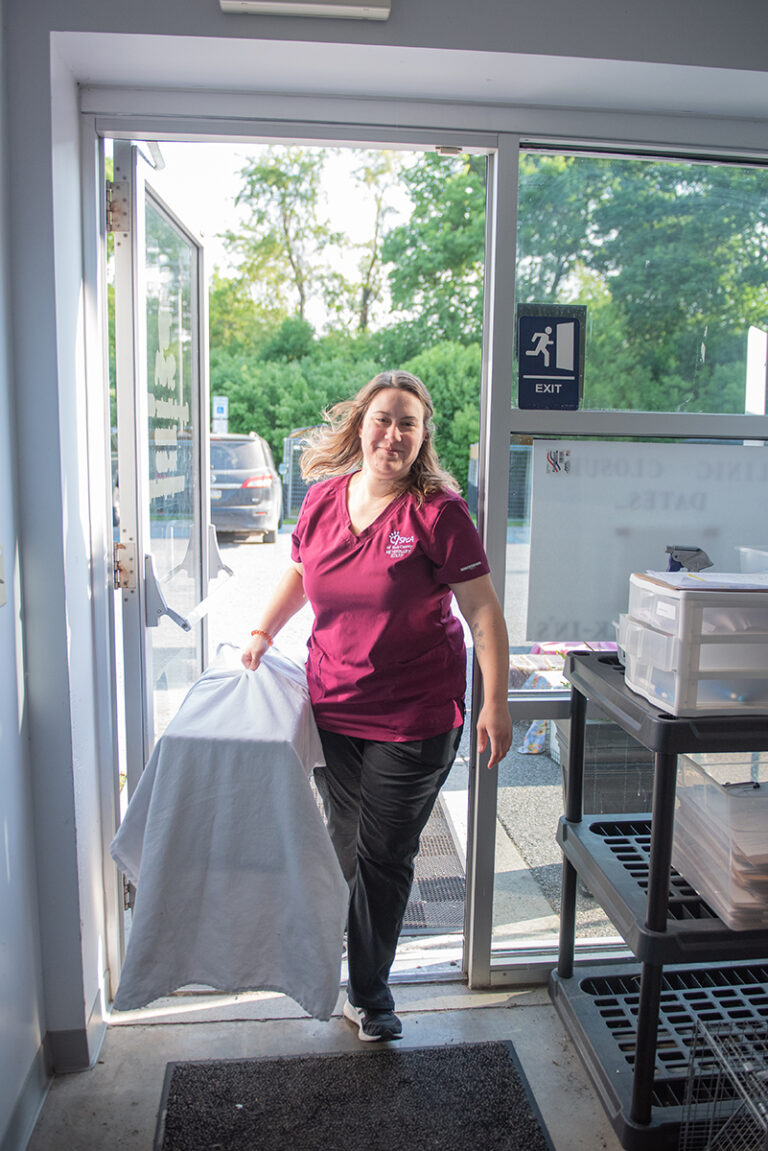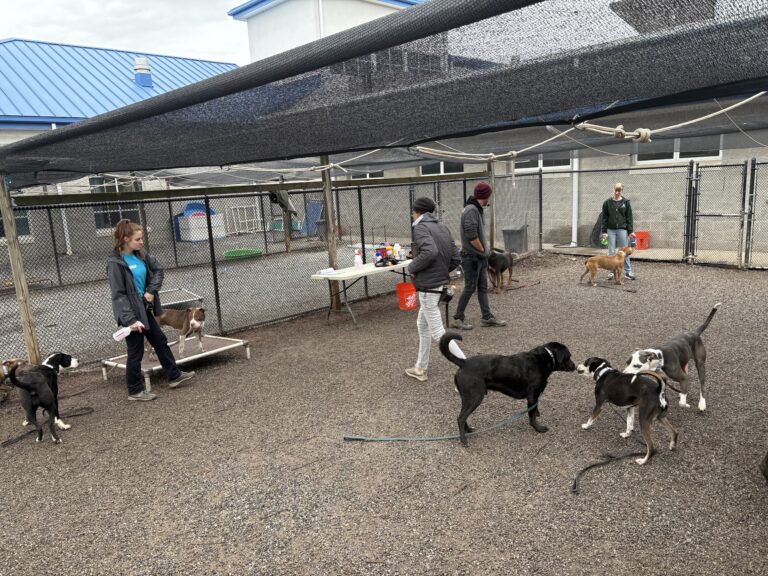This week, two recently admitted, unvaccinated dogs became symptomatic and tested positive for canine parvovirus or “parvo,” a highly contagious disease affecting dogs. Managing the spread of infectious diseases is an important function of shelter medicine. Our medical team works tirelessly to quarantine sick animals so that we can get them healthy and ready for adoption while keeping our entire shelter population healthy.
Today, a third dog entered our care, testing positive for canine parvovirus on arrival. The majority of the dogs in our care are fully vaccinated and are at low risk for contracting the disease. The parvo positive dogs are currently isolated away from our general population and the most at-risk exposed dogs are also quarantined in a separate area of the shelter. For at least the next 14 days, we are closely monitoring all dogs to ensure the safety of our shelter population. We have implemented numerous safety protocols to mitigate the spread of the disease. Currently, the cases and exposure are limited to one section of our kennel and, out of an abundance of caution, we have added safety protocols and taken steps to limit exposure so other dogs will not potentially contract the virus.
All three of the dogs mentioned were brought in from a small geographic area in York City – two on Madison Avenue and one from King Street.Residents in this area should be extremely cautious when walking their dogs and should ensure their dogs are fully vaccinated for canine parvovirus. Based on the sudden onset of their symptoms after arrival, we believe that they entered our shelter with the virus.
Because of the positive cases and the potential for exposure risk, we have made the difficult decision to cancel the adoption event scheduled for this Sunday, July 14 from 10 a.m. to 2 p.m. We will remain closed for public browsing in our dog kennel until Thursday, July 25. Public browsing hours for our cats and small animals will still be available Tuesday through Thursday and Saturday from 10 a.m. to 2 p.m.
While we must cancel this event, it is critical that we continue to place healthy, fully vaccinated dogs in adoptive homes. Most of our shelter population is at extremely low risk of contracting or spreading the virus. We are obligated by contract to take in stray and displaced dogs in York County. If we were to cease adopting out healthy, low risk animals, we would quickly have to close our doors to canine intake, leaving many animals at risk with no safe haven or resources in their time of need.
Our shelter is now at capacity for dogs, and events like we planned for Sunday are essential tools to get more dogs adopted, creating space for new incoming pets. Because we cannot safely have the public walk through our kennels, we plan to host a half-price dog adoption special from Sunday, July 14 through Saturday, July 20 by appointment only. Dogs that are available for adoption during this special are fully vaccinated, asymptomatic and very low risk for contracting the virus. Our main concern is the health and safety of the dogs in our shelter and pets in the community. Appointment-based adoptions will allow us to have thorough conversations to ensure there is no risk in placing a dog in their forever home. To make an adoption appointment, please call us at 717-764-6109 or email us at [email protected]. To view our available dogs, visit www.ycspca.org/adopt. We will continue to provide the public with any important updates. Thank you for your support for the York County SPCA and shelter pets in our community.
Canine Parvovirus FAQs
What is canine parvovirus or “parvo?”
Canine parvovirus is a contagious viral disease that attacks the gastrointestinal tract and bone marrow in dogs.
How is parvovirus spread?
The virus spreads through fecal material.
Who is most at risk for the infection?
Puppies and unvaccinated adults are most at risk.
What symptoms does parvovirus cause?
Parvovirus commonly causes diarrhea, vomiting, inappetence, lethargy, and dehydration.
How does the YCSPCA test for parvovirus?
The most common method of testing is a fecal ELISA test. This test can be completed in our facility in less than 15 minutes. Occasionally, further testing from an outside laboratory is needed to confirm an infection which takes several days.
How is parvovirus treated?
Treatment options depend greatly on how severe the infection is and what clinical signs are present. Maintaining proper hydration and nutrients is very important. Treating diarrhea, vomiting, and preventing infections are also mainstays of treatment.
How can parvovirus be prevented?
The canine parvovirus vaccination available is extremely effective. It is important to have dogs vaccinated against parvovirus when they are puppies, given every 3-4 weeks until they are 16 weeks (about three and a half months). After that, dogs should be revaccinated yearly or every three years, depending on the vaccine, to remain protected.
How is parvovirus handled in a shelter setting?
Unfortunately, periodic introduction of parvovirus into the shelter is inevitable due to unvaccinated animals in the community. Although parvovirus will always pose a risk for most shelters, the rate of infection can be greatly reduced by vaccination, quick recognition, appropriate quarantine of disease/exposed animals, and proper disinfection protocols.
How are positive dogs housed in the shelter?
A positive dog is isolated away from our general population to mitigate spread through the shelter. Exposed dogs are quarantined for 14 days (this is because it can take up to 14 days to come up positive for parvovirus after exposure) to help prevent an outbreak.




